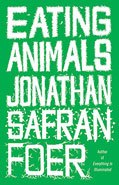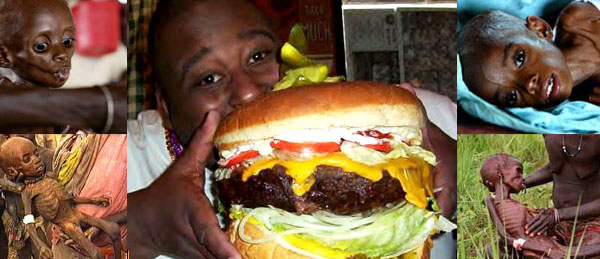Nearly one-third of the land surface of the planet is dedicated to livestock.
She Knows Better
Thanks for sharing the transcript of Nicolette's thoughts with me. I work at PETA, and she is a meat producer, but I think of her as my colleague in the fight against factory farming, and she is my friend. I agree with everything that she says about the importance of treating animals well and about the artificially low prices of factory-farmed meat. I certainly agree that if someone is going to eat animals, they should eat only grass-fed, pasture-raised animals—especially cattle. But here's the elephant in the room: Why eat animals at all?
First, consider the environment and the food crisis: there is no ethical difference between eating meat and throwing vast quantities of food in the trash, since the animals we eat can only turn a small fraction of the food that is fed to them into meat calories-it takes six to twenty-six calories fed to an animal to produce just one calorie of animal flesh. The vast majority of what we grow in the United States is fed to animals—that is land and food that we could use to feed humans or preserve wilderness—and the same thing is happening all over the world, with devastating consequences.
The UN special envoy on food called it a "crime against humanity" to funnel 100 million tons of grain and corn to ethanol while almost a billion people are starving. So what kind of crime is animal agriculture, which uses 756 million tons of grain and corn per year, much more than enough to adequately feed the 1.4 billion humans who are living dire poverty?
And that 756 million tons doesn't even include the fact that 98 percent of the 225-million-ton global soy crop is also fed to farmed animals. You're supporting vast inefficiency and pushing up the price of food for the poorest in the world, even if you're eating only meat from Niman Ranch. It was this inefficiency—not the environmental toll or even animal welfare—that inspired me to stop eating meat in the first place.
Some ranchers like to point out that there are marginal habitats where you can't grow foods but you can raise cattle, or that cattle can provide nutrients in times when crops fail. These arguments, though, are only seriously applied in the developing world. The foremost scientist on this issue, R. K. Pachauri, runs the Intergovernmental Panel on Climate Change. He won the Nobel Peace Prize for his climate work, and he argues that vegetarianism is the diet that everyone in the developed world should consume, purely on environmental grounds.
Of course the animal rights argument is why I'm at PETA, and basic science also tells us that other animals are made of flesh, blood, and bone, just like we are. A pig farmer in Canada killed dozens of women, hanging them on the meat hooks where the pig carcasses normally hung. When he was brought to trial, there was a huge visceral disgust and horror over the revelation that some of the women were fed to people who thought they were eating the farmer's pigs. The consumers couldn't tell the difference between ground pig flesh and human flesh. Of course they couldn't. The differences between human and pig (and chicken, cattle, etc.) anatomies are insignificant compared to the similarities—a corpse is a corpse, flesh is flesh.
Other animals have the same five senses that we do. And more and more, we're learning that they have behavioral psychological, and emotional needs that evolution [God] created in them just like it did in us. Other animals, like human beings, feel pleasure and pain, happiness and misery. The fact that animals are excited by many of the same emotions that we are is well established. To call all their complex emotions and behavior's "instinct" is stupid, as Nicolette clearly agrees. To ignore the obvious moral implications of these similarities is easy to do in today's world—it's convenient, politic, and common. It's also wrong. But it's not enough only to know what's right and wrong; action is the other, and more important, half of moral understanding.
Is Nicolette's love for her animals noble? It is when it leads her to see them as individuals and not want to harm them. But when it leads hear to be complicit in branding, ripping babies away from mothers, and slitting the throats of animals, it's harder for me to understand it. Here's why: apply her argument for meat eating to the farming of dogs and cats—or even human beings. Most of us lose our sympathy. In fact, her arguments sound eerily similar (and are structurally identical) to the arguments of slaveholders who advocated treating slaves better without abolishing slavery. One could force someone into slavery and provide "a good life and an easy death," as Nicolette put it, speaking of farmed animals. Is that preferable to abusing them as slaves? Sure. But that is not what anyone wants.
Or try this thought experiment: Would you castrate animals without pain relief? Would you brand them? Would you slit their throats open? Please try watching these practices (the video "Meet your Meat" is easily found on the Internet and a good place to start). Most people wouldn't do these things. Most of us don't even want to watch them. So where is the basic integrity in paying others to do these things for you? It's contract cruelty to animals, and a contract killing, and for what? A product no one needs—meat.
Eating meat may be "natural," and most humans may find it acceptable—humans certainly have been doing it for a very long time—but these are not moral arguments. In fact, the entirety of human society and moral progress represents an explicit transcendence of what's "natural." And the fact that most in the South supported slavery says nothing about its morality. The law of the jungle is not a moral standard, however much it may make meat eaters feel better about their meat eating.
After fleeing Nazi-occupied Poland, Nobel laureate Isaac Bashevis Singer compared species bias to the "most extreme racist theories." Singer argued that animal rights was the purest form of social-justice advocacy, because animals are the most vulnerable of all the downtrodden. He felt that mistreating animals was the epitome of the "might-makes-right" moral paradigm. We trade their most basic and important interests against fleeting human ones only because we can. Of course, the human animal is different from all other animals. Humans are unique, just not in ways that make animal pain irrelevant. Think about it: Do you eat chicken because you are familiar with the scientific literature on them and have decided that their suffering doesn't matter, or do you do it because it tastes good?
Usually, ethical decision making means choosing between unavoidable and serious conflicts of interest. In this case, the conflicting interests are these: a human being's desire for a palate pleasure, and an animal's interest in not having her throat slit open. Nicolette will tell you that they give the animal a "good life and an easy death." But the lives they give animals aren't nearly as good as those most of us give our dogs and cats. (They may give animals a better life and death than Smithfield, but good?) And in any case, what kind of life ends at the age of twelve, the human-proportionate age of the oldest non-breeding animals on farms like Bill and Nicolette's?
Nicolette and I agree about the importance of the influence our eating choices have on others. If you are vegetarian, that's one unit of vegetarianism in your life. If you influence on other person, you've doubled your entire life's commitment as a vegetarian. And you can influence many more, of course. The public aspects of eating are critical whatever your diet of choice.
The decision to eat any meat at all (even if the meat is from producers that are less abusive) will cause others you know to eat factory-farmed meat where they might otherwise not have. What does it say that the leaders of the "ethical meat" charge, like my friends Eric Schlosser and Michael Pollan and even the Niman Ranch farmers, regularly pull money out of their pockets and send it off to the factory farms? To me, it says that the "ethical carnivore" is a failed idea; even the most prominent advocates don't do it full-time. I have met countless people who were moved by Eric's and Michael's arguments, but none of them now eat exclusively Niman-type meat. They are either vegetarians or they continue to eat at least some factory-farmed animals.
Saying that meat eating can be ethical sounds "nice" and "tolerant" only because most people like to be told that doing whatever they want to do is moral. It's very popular, of course, when a vegetarian like Nicolette gives meat presents. But today's social conservatives are yesterday's "extremists" on issues like women's rights, civil rights, children's rights, and so on. (Who advocates half measures on the issue of slavery?) Why, when it comes to eating animals, is it suddenly problematic to point out what is scientifically obvious and irrefutable: other animals are more like us than they're unlike us? They are our "cousins," as Richard Dawkins puts it. Even saying "You're eating a corpse," which is irrefutable, is called hyperbolic. No, it's just true.
In fact, there is nothing harsh or intolerant about suggesting we shouldn't pay people—and pay them daily—to inflict third-degree burns on animals, rip out their testicles, or slit their throats. Let's describe the reality: that piece of meat came from an animal who, at best—and it's precious few who get away from an animal who, at best—was burned, mutilated, and killed for the sake of a few minutes of human pleasure. Does the pleasure justify the means?
Source: Eating Animals by Jonathan Safran Foer












